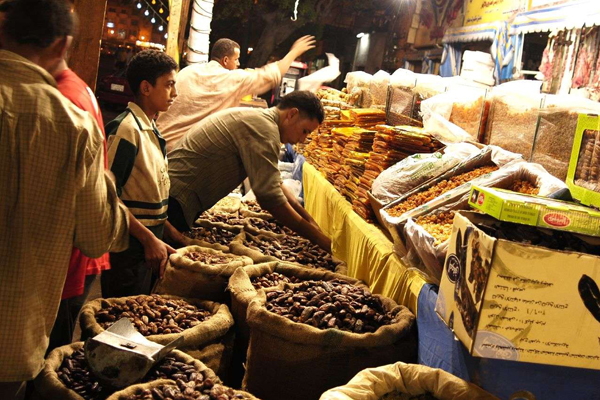From the bank teller to the housewife is a short journey of just a few hours as monthly pay cheques are handed over to employees, who pay bills and overdue debts and give the rest to the housewife, or rather the ‘finance minister of the household’, the person who handles the monthly expenses based on her vision and experience.
This scenario is repeated every month inside every home, with slight differences according to the needs and conditions of each. A sudden hike in prices ahead of the holy month of Ramadan inevitably leads to amended plans and household budgets to deal with the expected crisis during the second half of the month, as a group of housewives gather at a grocery market to buy the things they will need for the holy month, particularly the first day’s banquet.
Buying Ramadan yamish is the main reason for the deficit in the household’s monthly budget. Even in normal days things are not that easy, says housewife Hayat Muhammad. Dates and amar al-din (dried apricots) are particularly expensive, and most middle-income families give up some of Ramadan’s less necessary treats, like nuts, prices of which soar year after year, to pay for the necessities, she says.
As for the daily iftar (breakfast) supplies, she usually buys vegetables, and as she does not trust prices to be stable in Ramadan and she tends to buy large quantities enough for at least the first ten days.
Hala Mahmoud, another housewife, points to the large differences in prices of Ramadan foodstuffs. Some are expensive, others are cheap, while others still are moderate and are in high demand by consumers. Mahmoud cited a kilogram of dates ranging from LE5 to LE40, and says those selling for LE25 pounds are the best in terms of cost and quality compared with others.
Market movement is stable to a large extend, as prices of some commodities are high but can be avoided as a solution, housewife Salwa Samir says, adding that there is always an alternative. As for the monthly budget problem, she agrees that the peak comes during the second half of the month.
Yehia al-Darwah, a greengrocer, says prices are stable in a way that some see as different from usual during the few days ahead of Ramadan. Prices so far have not changed, but a slight increase is expected during the first few days as people tend to buy certain vegetables in particular. Egyptian dishes on the first days of the month are similar in most homes, he says, and al-Obour wholesale market always controls prices of vegetables whether high or low.
Yamish vendor Tarek Muhammad referred to the high demand for Ramadan foodstuffs, especially dates, which are the most important item of the month. Some families give up other foodstuffs because they consider them unnecessary, but that is not the case with dates, he says. One cannot compare prices this year with previous years because the needs of the customers are stable and their demands are only slightly different.


